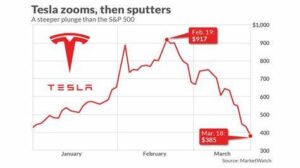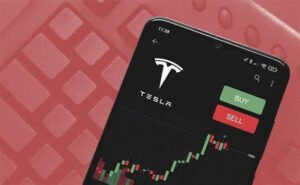
5 Key Drivers of Tesla Stock Swings. Tesla Stock Movement: Analyzing the Latest Trends
Tesla’s stock has recently experienced notable fluctuations. Here’s a breakdown of the factors influencing its price movements. 5 Key Drivers of Tesla Stock Swings.
Recent Stock Performance
The shares increased slightly by 3 cents, reaching $201.41. This small uptick came as S&P 500 and Dow Jones futures also saw modest gains of 0.1% and 0.2%, respectively.

Market Conditions and Influences
Tesla’s shares fell by 3.1% on Wednesday, despite positive inflation data. This data suggests the Federal Reserve may reduce interest rates by year-end. Lower rates generally make car purchases more affordable, which could benefit Tesla. General Motors’ stock also saw a rise of 0.7% in response to these economic conditions.

Recent Trends and Volatility
Tesla’s stock had a volatile week. On Tuesday, the shares surged by 5.2% following better-than-expected wholesale inflation data. As of Thursday, the stock was up around 0.7% for the week. This reflects a small upward trend amidst a backdrop of significant daily fluctuations.
Influential Factors
Several factors have impacted Tesla’s stock recently. Inflation data has been a major influence. Investors have been closely watching this data for clues about future interest rates.
Elon Musk’s conversation with former President Trump on Monday also made headlines. The discussion led to a complaint from the United Auto Workers union, accusing Musk of intimidating workers interested in unionizing. However, this issue is not expected to have a major impact on Tesla’s stock in the near future.
Full Self-Driving (FSD) Software Review
Stein’s review was mixed. He acknowledged the positive feedback for the software but also noted some issues. The FSD software is Tesla’s advanced driver-assistance system. Despite its capabilities, it still requires drivers to remain fully attentive. Stein had concerns about the software’s ability to deliver on its promises of full autonomy.
Sales and Demand
Year-to-date, Tesla’s stock is down by about 19%. In the first half of 2024, Tesla delivered approximately 831,000 vehicles.
Tesla’s sales performance and demand for its electric vehicles (EVs) have recently faced notable challenges. As of the first half of 2024, Tesla delivered approximately 831,000 vehicles, reflecting a 7% decrease compared to the same period last year. This drop in deliveries highlights a shift in the market dynamics and investor sentiment.
The slowdown in demand for EVs is influenced by multiple factors. Firstly, the overall automotive market has experienced a cooling period. Increased competition from other automakers and a broader range of electric vehicle options have fragmented the market. Tesla, once the undisputed leader in the EV space, now faces heightened competition from both traditional car manufacturers and new entrants. This growing competition may be affecting Tesla’s market share and overall sales volume.
Additionally, the economic environment plays a crucial role. Fluctuating inflation rates and potential changes in interest rates can impact consumer purchasing power. Higher interest rates could make financing more expensive, thus potentially dampening consumer enthusiasm for purchasing new vehicles. Although the recent inflation data suggests a potential easing of rates, uncertainty about the Federal Reserve’s future actions continues to influence consumer sentiment.
Another factor to consider is the evolving consumer preferences. While Tesla’s vehicles remain popular for their innovation and performance, some buyers may be hesitant due to economic uncertainty or shifting preferences towards other forms of transportation. This evolving landscape requires Tesla to adapt its strategies to maintain consumer interest and stimulate sales.
In response to these challenges, Tesla has been focusing on various strategies. These include expanding its product lineup, enhancing its technological advancements, and improving customer experience. By addressing these factors, Tesla aims to boost its sales and better align with market demand in a competitive and shifting landscape.
Looking Ahead
Tesla faces several challenges and opportunities. The company’s stock performance is influenced by broader economic conditions and specific company developments. Investors should keep an eye on inflation trends, interest rate changes, and advancements in Tesla’s technology.
As Tesla navigates its current challenges, several key factors will shape its future trajectory. The company faces a complex mix of opportunities and hurdles that will influence its stock performance and overall market position.
Economic Influences and Interest Rates
One significant factor affecting Tesla’s future is the economic environment. Lower rates typically make borrowing cheaper, potentially boosting consumer spending on big-ticket items like electric vehicles. However, uncertainty remains regarding the timing and extent of these rate changes. Investors and consumers alike will be watching closely to gauge how these economic conditions evolve and impact Tesla’s sales.
Technological Advancements
Tesla’s commitment to innovation is another crucial factor. The company’s advancements in Full Self-Driving (FSD) technology, battery improvements, and new vehicle models will play a significant role in shaping its future. Successful deployment of autonomous driving technology could enhance Tesla’s competitive edge and attract more buyers. Additionally, continued progress in battery technology may improve vehicle range and reduce costs, further driving consumer interest.
Market Competition
The growing competition in the electric vehicle market poses both a challenge and an opportunity for Tesla. As more automakers enter the EV space, Tesla will need to maintain its leadership through innovation, quality, and customer service.
Conclusion
Tesla’s stock has seen significant movements recently, driven by a mix of economic indicators and company-specific news. As the company navigates through these fluctuations, staying informed about both market conditions and internal developments will be crucial for investors. Tesla’s ability to manage these factors will likely play a key role in its future stock performance.







